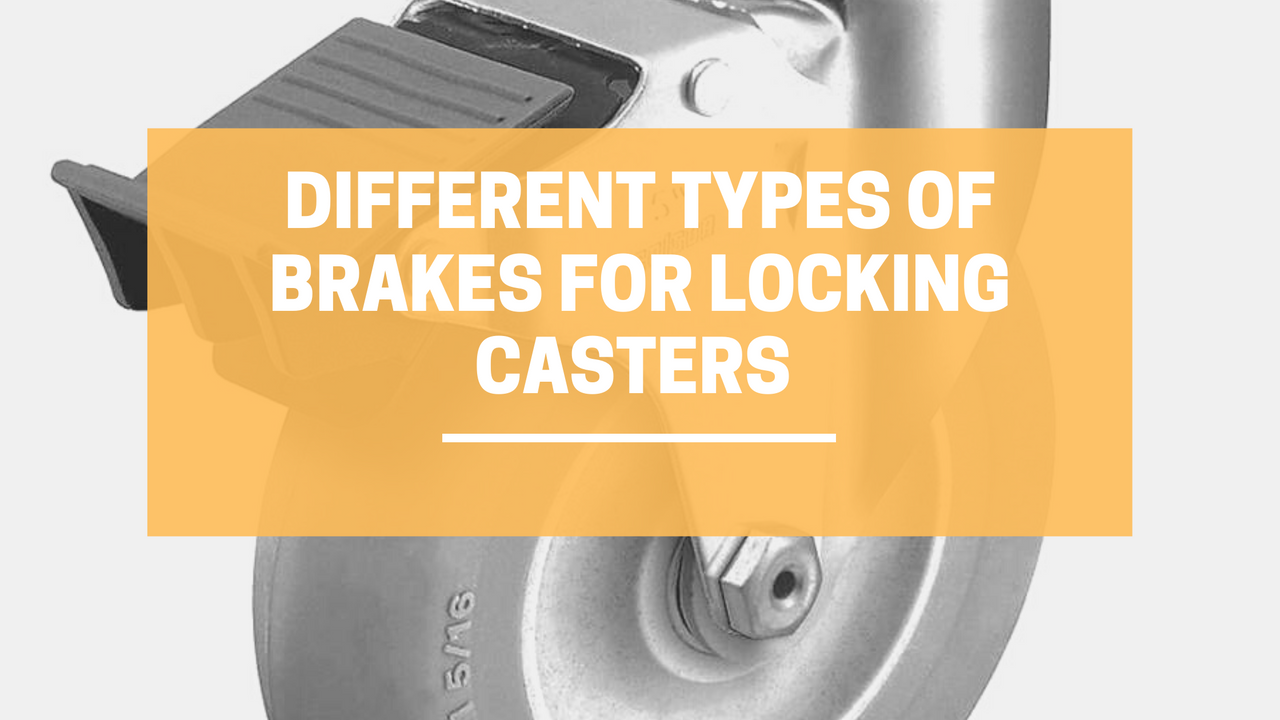Different Types of Brakes for Locking Casters
Equipment such as racks, carts, and worktables often come with heavy-duty locking casters to help with transportation. Locking casters keep these fixtures steady while they’re being used or loaded, so they won’t unexpectedly roll away and cause injuries or property damage.
Before choosing a heavy-duty caster with brakes for your project or business, you need to learn about the different types of brakes on locking casters. The type of brake will determine the type of application a lockable caster is best used for. For instance, some types of brakes allow better maneuverability, while others may not be recommended for use on ramps or in heavy-duty industrial settings.
Here are the three common types of brakes for locking casters:
Side Lock Brake
Side lock brakes are commonly used for carts, tool boxes, grills, and beds. They often come with a pedal, which is used to activate the lock. The friction that the pedal creates between the wheel and its casing prevents movement and keeps your equipment in place. The harder you push the pedal down, the tighter the lock will be.
There are two common types of side lock brakes:
Cam Lock Brakes
This type of side lock brake works by causing the cam, which can be found at the side of the caster, to tighten directly against the wheel’s hub. It also requires the use of a pedal to create friction and keep the wheel from moving.
Cam lock brakes are generally cheaper but less secure than top lock brakes. They’re also lighter and more suitable for equipment that requires larger wheels. In fact, they’re often the recommended type for heavy-duty locking casters with a 2” diameter rigid caster or wide swivel.
Top Lock Brakes
Top lock brakes also are activated from the side, but they come with an L-bar that tightens and locks the wheel. When the L-bar is engaged, it’ll put more pressure on the tread, applying friction and keeping the wheel from freely moving.
Most top lock brakes still work well under harsh operating conditions. They’re suitable if you’re working in a wet or corrosive environment, as the materials used for them are durable thermoplastics or heavy-duty metals.
Face Contact Brake
A face contact brake is engaged by manually pressing a lever or tightening a large T-screw. Either action will move the brake shoe closer to the face of the wheel, creating friction and keeping it from moving.
Face contact brakes offer extensive holding pressure, making them a great choice if you’re working with heavier loads. They’re highly recommended for wheels with a heavier tread. However, they may not work as well for certain types of wheels made from more flexible, shock-absorbing, or softer materials.
Total Lock Brake
As its name suggests, a total lock brake stops all types of movement with a simple press of your foot on the brake pad. It’s a popular choice for many because it’s easy to use and requires little maintenance. It only has two moving pieces, which are usually made from rust-resistant thermoplastics.
A total lock brake is probably considered the most stable braking system on this list. They’re commonly found in industrial and commercial settings, as they’re perfect for transporting heavy products. The equipment comes to a complete stop, offering better security for both the equipment and the load it’s carrying. There’s no rolling or swiveling, no give, and no extraneous movement.
Conclusion
There are so many heavy-duty casters with brakes on the market, which makes finding the right fit for your project a tough job. If you still haven’t decided which type of brake is the most compatible and affordable choice for your situation, contact us today. Our friendly and trusted staff members will ensure that you’re getting lockable casters with the right brakes.
Remember, finding the right brake-and-caster combination isn’t something you should leave up to chance. We made sure that our casters and brakes are high-quality, reliable, and durable, so they’re perfect for their intended application.
So, what are you waiting for? Shop LINCO to find the right locking caster for your application. If you have questions regarding casters, contact us or give us a call at 866-306-9566 for assistance.

